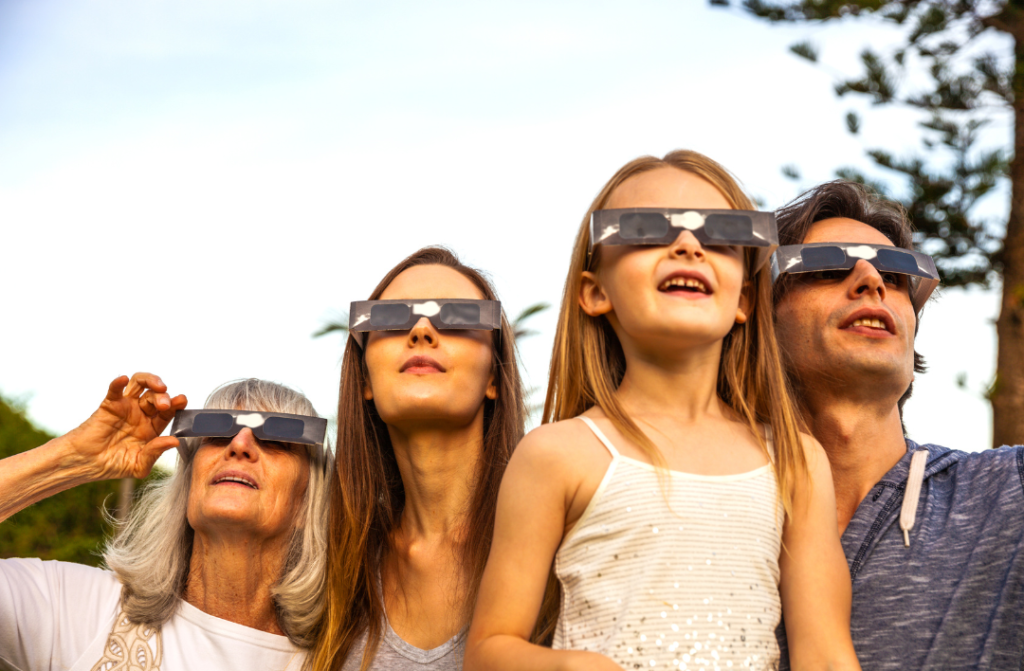It’s not often that we have the opportunity to witness nature’s displays of celestial grandeur. Many of us sometimes forget to look at the night sky, which brings me to the upcoming astronomical event promising that 99% of people who reside in the United States will be able to see a partial or total solar eclipse from where they live.
Whether you watch from your backyard or in a bigger setting along with other eclipse-chasers, the 2024 total solar eclipse is a convergence of science, spectacle, and experience that we all should watch! If you haven’t yet, plan and be ready to see one of the grandest shows that nature has to offer.
The Path of Totality Across America
On April 8, 2024, a path of totality will stretch from Mexico through Texas, up into the Midwest, across the Great Lakes, and out over the Atlantic Ocean. For those fortunate enough to be within this path, the sun will be completely obscured by the moon, plunging the landscape into a temporary twilight and unveiling the ethereal solar corona.
This is a pivotal moment for scientific observation. Eclipses provide a rare window into the sun’s outer atmosphere, or corona, where temperatures soar to millions of degrees. The 2024 eclipse, coupled with technological advances, such as space-based and ground-based telescopes and instruments, will allow for unprecedented study of the corona, potentially yielding new insights into solar physics and space weather.
A Glimpse of Solar Drama

Unlike the 2017 eclipse, which was relatively short, the 2024 eclipse will offer a total duration that exceeds four minutes in some locations. This extended moment of darkness will not only provide viewers with a longer-lasting experience but also create conditions for seeing phenomena like shadow bands — ripples of light and dark that dance across the ground just before and after totality — and Baily’s beads and the diamond ring, which occur as sunlight breaks through the lunar valleys and craters.
Eclipses of this magnitude are rare and offer a testament to the clockwork precision of celestial mechanics. The 2024 eclipse stands out not just for its accessibility but for the confluence of factors that make it particularly special. For many, it will be a once-in-a-lifetime event, as the next opportunity to witness such a spectacle from the United States won’t arrive until 2045.
Safely Enjoying the Solar Eclipse

It’s important to note that observing a solar eclipse requires taking precautions to protect your eyesight. Specialized solar filters for direct viewing, pinhole projectors, and other indirect viewing methods are essential for experiencing the eclipse without risking eye damage. For those looking to the skies in 2024, the American Astronomical Society and other organizations will provide guidelines on how to enjoy the eclipse safely.
Preparation is key to experiencing a total solar eclipse. Location, weather, and logistics are crucial to making the most of this rare event. Travelers will need to secure accommodations along the path of totality well in advance, considering potential congestion. Keeping an eye on the weather forecast will ensure that clouds don’t eclipse the eclipse.
The Environmental Impact
The 2024 eclipse not only offers a platform for scientific discovery but also serves as a reminder of our environmental interconnectedness. Eclipses have been observed to influence animal behavior, plant life, and atmospheric conditions. Birdsong ceases, nocturnal creatures emerge, and the changing light can affect plant processes. By documenting these phenomena, we gain a greater understanding of our own planet’s ecosystem.
For those who witnessed the 2017 eclipse, the 2024 event will serve as a continuation of a celestial narrative. For others, it will be the start of a celestial tradition — a milestone that may be cherished for generations. Communities along the path of totality will host events and activities, providing opportunities to celebrate, learn, and share the experience with others.
Share with us why you should watch the 2014 total solar eclipse.
 Food
Food Farmers
Farmers Sustainable Living
Sustainable Living Living Planet
Living Planet News
News